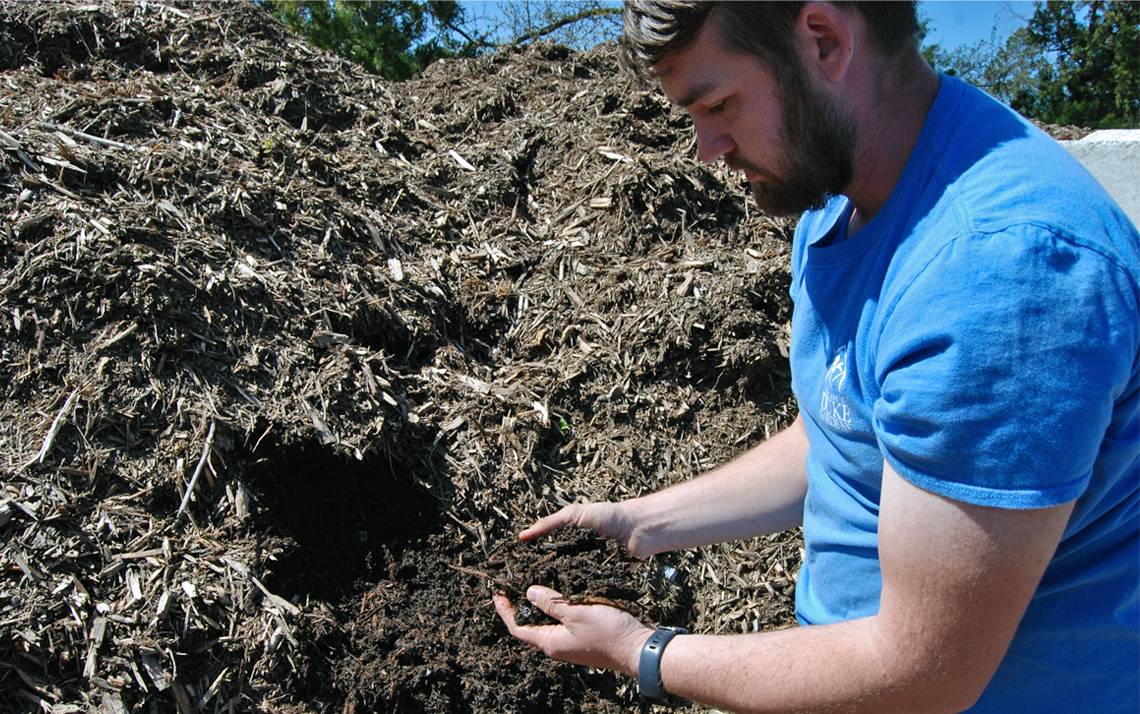Brown is the New Green
Sarah P. Duke Gardens ramps up its embrace of composting

At first, the brown piles that cover part of the maintenance area at Sarah P. Duke Gardens don’t look all that special. Since early last year, these large mounds are where sawed-off tree limbs, yanked weeds and past-their-prime annuals end up after a trip through a massive grinder.
But once Nick Schwab, assistant horticulturist at Duke Gardens, digs his hand in, it’s easy to see why the heaps represent a large step toward sustainability.
“It’s already broken down a lot,” Schwab said while holding a wad of soft, black compost that will soon nourish plants across Duke’s campus.
Composting, the process of using decomposing organic matter to create healthy soil, is nothing new. As Duke embraces ways to shrink its environmental footprint, composting has become more common.
 Duke Facilities Management Department has bins for compostable waste in buildings across campus, and Duke Dining composts waste from kitchens and dining rooms. Duke built an innovative system into the Brodhead Center that captures, grinds and stores compostable food scraps from eateries for easy removal by Brooks Contractor, a commercial composting operation that turns waste into nutrient-rich soil sold to landscapers and gardeners.
Duke Facilities Management Department has bins for compostable waste in buildings across campus, and Duke Dining composts waste from kitchens and dining rooms. Duke built an innovative system into the Brodhead Center that captures, grinds and stores compostable food scraps from eateries for easy removal by Brooks Contractor, a commercial composting operation that turns waste into nutrient-rich soil sold to landscapers and gardeners.
“Composting is the next wave of waste management,” said Morgan Bachman, Duke’s Recycling and Waste Reduction Coordinator. “It’s another way to divert materials from the landfill and give them a more productive lifespan.”
Compost from the system at Duke Gardens, meanwhile, doesn’t leave campus.
Composting the constant flow of material removed from the gardens has always been a challenge. Traditional methods require compost piles to be turned by hand or machinery on a weekly basis so microbes responsible for breaking down waste receive the oxygen necessary to carry out the decomposition process.
But early last year, the gardens installed an innovative system offered by O2Compost, which pumps air through pipes placed under the piles, allowing material to decompose twice as fast, making on-site composting feasible.
“This is a system we recently became aware of and are excited to be able to apply on this scale,” said Duke Gardens Director of Horticulture Robert Mottern. “This unique system made it all possible.”
Earlier this year, Landscape Services, which sometimes clears around three to four truckloads of plant debris and clippings from campus each day, started sending its landscape waste to the gardens for composting instead of hauling it to a landfill.
“The best part is that we save a lot of time,” said Bryan Hooks, director of Landscape Services, which is part of Duke’s Facilities Management Department. “That’s several hours a week that we don’t have to spend driving to the landfill.”
And for the first time this spring, Landscape Services used compost created in Duke Gardens to enrich planting beds across campus.
“It’s nice knowing that all this material is not leaving Duke,” said Schwab, the assistant horticulturist at Duke Gardens. “It’s staying here.”
For more on Duke’s sustainability efforts, visit sustainability.duke.edu